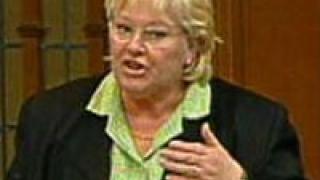Scottish MP, Margo MacDonald launches right-to-die plans

An independent member of Scottish Parliament has unveiled a Bill, which would make it legal to help those with terminal illness end their lives.
Margo MacDonald, an independent MSP, has introduced the End Life Assistance (Scotland) Bill that would allow anyone aged over 16 to request help to die so long as they had been diagnosed as terminally ill or permanently physically incapacitated and find life ‘intolerable’.
Under the Bill, the person must have been registered with a GP in Scotland for at least 18 months, made two formal requests for assisted suicide approved by a medical practitioner and must have had a meeting with a psychiatrist.
Margo MacDonald said the Bill did not apply to people unless they were ‘in full control of their faculties’. The MSP, who has Parkinson’s disease, has already said she would like to be allowed to bring about her own death if her condition deteriorated.
The Bill was backed by Agnes Stevenson, 67, from Prestonpans in East Lothian, who has twice fought breast cancer but said she would rather end her life than undergo further medical treatment.
However, the proposals of Margo MacDonald have drawn serious opposition, which urged MSPs to proceed with ‘extreme care and caution’.
Dr Calum MacKellar, Director of Research at the Scottish Council on Human Bioethics, said:
‘If Scottish society accepts to legalise assisted suicide it would mean that it agrees, for the first time, that some human lives no longer have any meaning, value or worth.
‘It is important for Scottish society to make sure that all persons are respected with an undiminished dignity, no matter what control over their lives they have lost or may eventually lose,’ he said.
Dr MacKellar said an analysis of the figures revealed that support for the proposals dropped dramatically when people were given the full facts.
A spokesman for Care Not Killing, an alliance of individuals and organisations which brings together disability and human rights organisations, healthcare and palliative care groups, said:
‘Are we seriously contemplating unleashing onto the public a law that would licence relatives or friends to assist in the killing of people with terminal or degenerative illnesses or disabilities?’
Dr Brian Keighley, chairman of the BMA in Scotland, confirmed his opposition and questioned the role of doctors if the Bill becomes law.
‘If doctors are authorised by law to kill or help kill they are taking on an additional role which we believe is alien to the one of care giver and healer.
‘The traditional doctor-patient relationship is founded on trust and this risks being impaired if the doctor’s role encompasses any form of intentional killing,’ he said.
The Rev Bill Hewitt, moderator of the Church of Scotland’s General Assembly, said that sanctioning such a move will not improve society, which would be better served by ‘showing love and compassion to those around us, especially the most vulnerable’.
All Scottish parties will allow a free vote on the Bill, with all ministers also able to vote with their consciences, although First Minister Alex Salmond has said he is not persuaded.
